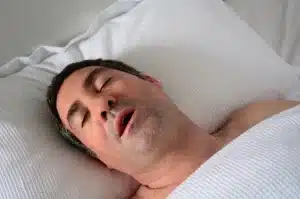What Are The Side Effects Of Snoring: Health Impacts and Risks
Snoring is a common sleep disorder characterised by the vibration of respiratory structures due to obstructed air movement during breathing while sleeping. For some people, snoring is simply a nuisance, but for others, it may signal more serious health issues. Snoring occurs when the flow of air through the mouth and nose is physically obstructed, which can be caused by a variety of factors such as the anatomy of your mouth and sinuses, alcohol consumption, and body weight.
The effects of snoring extend beyond just noise during sleep. People who snore heavily often experience disrupted sleep patterns and, consequently, daytime tiredness & fatigue. Over time, these sleep disturbances may lead to more significant cognitive and behavioural changes. There may also be cardiovascular implications; research indicates that intense snoring can create turbulence in carotid artery blood flow, potentially increasing the risk of atherosclerosis and stroke. People who snore, and their partners, must pay attention to this condition and its potential consequences.
Table of Contents
Toggle

Understanding Snoring and Its Causes
Snoring is a common condition characterised by noisy breathing during sleep, often indicating disrupted airflow in the respiratory structures.
Anatomy of Snoring
Snoring occurs when the air’s flow through the nose and throat is partially obstructed during sleep. This obstruction leads to the vibration of surrounding tissues, which, in turn, results in the characteristic sound of snoring.
- Throat: The relaxation of throat muscles occurs naturally during sleep.
- Uvula and Soft Palate: Can flutter due to these relaxed muscles, contributing to the sound.
- Nose: A deviated septum or structural defect can impede airflow.
- Tongue: It can fall back, narrowing the airway further.
Common Causes and Risk Factors
Several factors can elevate the risk of snoring or worsen its severity, often related to anatomical characteristics and lifestyle choices.
- Weight: Individuals who are overweight have extra tissues in the throat that can narrow the airways.
- Age: Aging can lead to weaker throat muscles, making snoring more likely.
- Alcohol Consumption: Drinking alcohol before bed can over-relax the throat muscles.
- Smoking: It can irritate the nasal and throat lining, leading to swelling and increased snoring.
- Allergies or Nasal Congestion: These conditions can limit airflow through the nose.
- Sleeping Position: Sleeping on the back can cause the tongue to move to the back of the throat.
Health Impacts of Snoring
Snoring can seem harmless, but it can have serious consequences on your health, ranging from short-term disturbances to significant long-term complications.
Short-Term Effects
Snoring can disrupt sleep, leading to daytime sleepiness and fatigue. It can be an annoyance to a partner, often resulting in sleep disruption for them as well. The immediate effects may not seem alarming, but a consistent lack of rest can negatively affect overall well-being and performance during the day.
Long-Term Complications
Persistent snoring may signal a sleep disorder such as obstructive sleep apnoea, characterised by breathing pauses and gasping for air. This can create turbulence in carotid artery blood flow, potentially leading to more serious health conditions. Over time, untreated snoring and obstructive sleep apnoea can increase the risks of stroke, high blood pressure, metabolic disease, and depression. It’s vital to recognise snoring as a potential risk factor for these complications and manage the condition proactively to maintain all aspects of our health.

Diagnosis and Evaluation
Diagnosing and evaluating snoring involves a thorough examination to understand its causes and potential health risks. Effective diagnosis is crucial for identifying suitable treatments.
Professional Assessment
A healthcare provider typically begins by reviewing the patient’s medical history and symptoms. They may inquire about the frequency and loudness of the snoring, incidents of tiredness & sleepiness, and whether the patient wakes up with headaches. The sleep specialist will assess risk factors and symptoms that may suggest a more serious condition, such as sleep apnoea.
Diagnostic Tests
Following a preliminary examination, the healthcare provider may recommend diagnostic tests. A common procedure is polysomnography, a type of sleep study conducted overnight to monitor breathing, heart rate, brain activity, and more. In some instances, simpler tests like home-based sleep studies might be sufficient. If structural anomalies are suspected, imaging tests like X-ray or magnetic resonance imaging may be performed. Continuous positive airway pressure devices or oral appliances may be recommended post-diagnosis for people to alleviate symptoms and improve sleep quality.
Treatment Options for Snoring
Effective management of snoring can lead to better sleep quality for individuals and their partners. This section outlines non-surgical approaches and medical interventions with a focus on dental snoring devices and lifestyle modifications.
Lifestyle Modifications
A change in every day habits can significantly reduce snoring:
- Weight Loss: A decrease in body weight may ease snoring by lessening pressure on the throat.
- Side Sleeping: Lying on one’s side can prevent the tongue from blocking the throat, thus reducing snoring.
- Alcohol Consumption: Avoiding alcohol before bedtime can prevent throat muscle relaxation that leads to snoring.
- Pillows & bed: Elevating the head or upper torso with a pillow or adjustable bed can help maintain an open airway throughout the night.
Medical Interventions
Medical solutions range from oral appliances to surgery. Two common non-invasive treatments are:
- Dental Snoring Devices: These are also known as mandibular advancement splints (MAS) that reposition the lower jaw forward to keep the airway open.
Mandibular Advancement Splint (MAS) Therapy:- Function: MAS devices advance and stabilise the jaw, reducing airway collapse and vibration of tissues.
- Customisation: Dentists can provide a custom-fitted MAS, ensuring comfort and efficacy.
- PAP Therapy: Also commonly known as ‘CPAP’ or continuous positive airway pressure which stabilises the upper airway from collapse by introducing an air pressure via a mask that goes over the nose or nose and mouth. These are commonly now auto-adjusting and are referred to as ‘APAP’.
MAS therapy is considered effective, especially when anatomic issues such as a retracted jaw contribute to snoring. Regular check-ups with a dentist to adjust the device and assess oral health are part of ongoing care. MAS devices are generally speaking equally effective to CPAP for mild-moderate obstructive sleep apnoea and snoring. They are recommended as an alternative treatment for people with severe obstructive sleep apnoea who are unable to use CPAP.
When to Seek Medical Advice
If you or someone you know exhibits frequent snoring, it’s important to be aware of when professional medical advice should be sought. Although occasional snoring may not be cause for concern, there are certain signs indicating that snoring might be a symptom of a more serious health condition, such as obstructive sleep apnoea (OSA). Here are some triggers that should prompt a visit to a medical professional:
- Persistent Snoring: If snoring happens regularly and is loud enough to disrupt the sleep of others, it may signal a need for a medical assessment.
- Pauses in Breathing: Observing pauses in breathing during sleep should not be ignored, as this may be a sign of OSA.
- Excessive Daytime Sleepiness: Feeling overly tired during the day or experiencing fatigue may be related to poor quality sleep caused by snoring.
- Disrupted Sleep: Frequent waking from sleep or difficulties staying asleep may be tied to snoring and warrant further investigation.
- Morning Headaches: Regularly experiencing headaches upon waking can be associated with disruptions in sleep, such as those caused by snoring.
- Sore Throat upon Awakening: Waking up with a sore throat regularly can sometimes be linked to snoring.
- Concentration Problems: Struggling with focus and concentration can sometimes stem from sleep interruption by snoring.
In clinical settings, formal diagnosis of sleep-related disorders typically requires a sleep study. Medical professionals may endorse the use of an oral appliance, especially if snoring is identified as part of a condition like OSA. For those prescribed an oral appliance, consistent reviews and adjustments are vital to ensure the effectiveness of the treatment.
Should symptoms persist or cause significant disruption to daily living, book an appointment at one of our many locations across Queensland today. Remember that addressing issues early can significantly enhance quality of life and long-term health.




